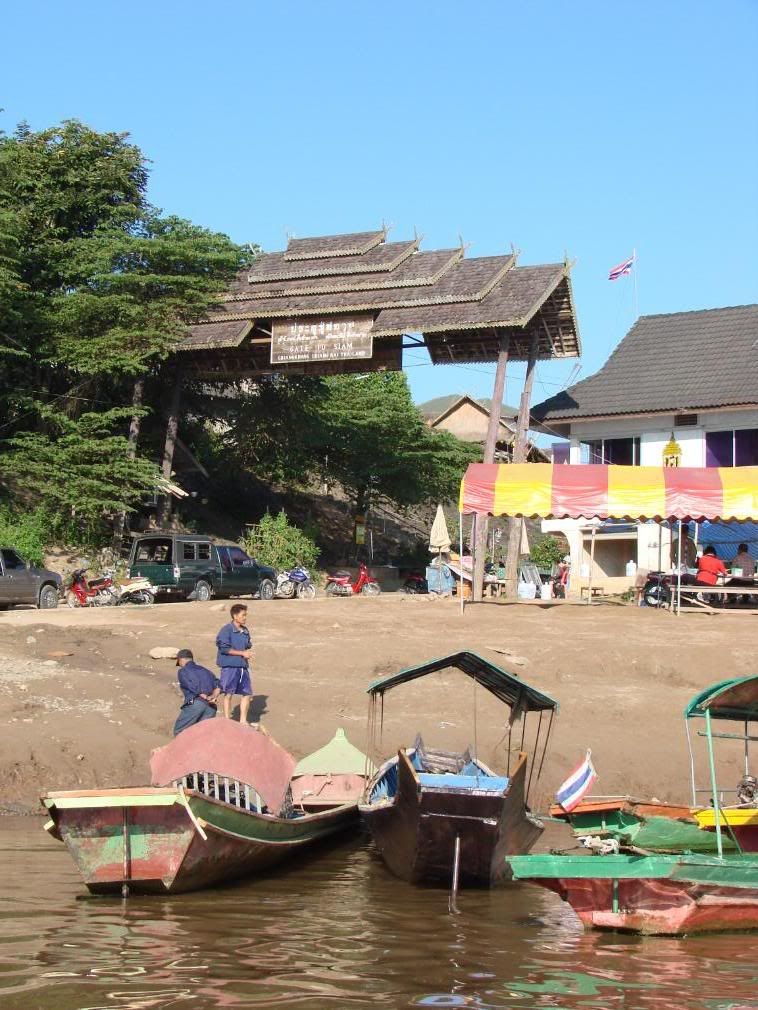 We’d been forewarned that traveling in Laos was time consuming so we expected complications but our connecting bus left just 10 minutes after arrival. (Concerning the slow pace, locals like to say that Laos PDR stands for “People Don’t Rush” rather than People’s Democratic Republic.) Packed in to a small van with eight other men we departed. One of the passengers carried on a canister which initially blasted our noses with the overwhelming odor of gasoline, despite the windows being down. Over time we unfortunately acclimated to this smell, and an even more disturbing stench began to materalize: a toxic combination of two-week old BO and rotting meat. Once the man with the gas can got dropped off, the air quickly became unbreathable. The driver grew very agitated and gave each of us piercing stares in the rearview mirror while we each looked around trying to pinpoint the malodorous culprit. After what seemed an eternity, the bus driver finally stopped the bus and threw the two passengers off who were sitting directly behind us, in the middle of nowhere. Breathing a collective sigh, we continued north through some beautiful rolling green mountains, stopping occasionally to peruse the the freshly slaughtered giant rabbits that were on display on the side of the road. It was a crazy ride to say the least.
We’d been forewarned that traveling in Laos was time consuming so we expected complications but our connecting bus left just 10 minutes after arrival. (Concerning the slow pace, locals like to say that Laos PDR stands for “People Don’t Rush” rather than People’s Democratic Republic.) Packed in to a small van with eight other men we departed. One of the passengers carried on a canister which initially blasted our noses with the overwhelming odor of gasoline, despite the windows being down. Over time we unfortunately acclimated to this smell, and an even more disturbing stench began to materalize: a toxic combination of two-week old BO and rotting meat. Once the man with the gas can got dropped off, the air quickly became unbreathable. The driver grew very agitated and gave each of us piercing stares in the rearview mirror while we each looked around trying to pinpoint the malodorous culprit. After what seemed an eternity, the bus driver finally stopped the bus and threw the two passengers off who were sitting directly behind us, in the middle of nowhere. Breathing a collective sigh, we continued north through some beautiful rolling green mountains, stopping occasionally to peruse the the freshly slaughtered giant rabbits that were on display on the side of the road. It was a crazy ride to say the least.Our purpose in going to Muang Sing was to go on a village trek and according to Lonely Planet (LP) this was the best spot to do them. And now a brief tangent about LP. Having been using LPs throughout our trip we’ve developed a love/hate relationship with it. On the one hand, it is indispensable for traveling in a foreign country unless one meticulously plans beforehand, which all but eliminates any spontaneity, one of the joys of travel. On the other, much larger, hand, LP can be extremely annoying. The information is often outdated (even in a brand new edition since the time interval to press is about two years), the recommended guesthouses and restaurants generally inflate their prices because of the increased demand, and many travelers rely on it like a crutch (including us at times). Nonetheless, in this particular instance, we would have never known about Muang Sing without LP. Yet had we followed their advice and gone with the government-sponsored trekking company (the only one listed in the most recent LP) we would’ve been disappointed since the authenticity of the experience had been virtually eliminated due to overexposure (according to other trekkers who’d just returned). Fortunately, a brand new company had just been launched a few months prior that had formed a collective of ten villages to prevent overexposure. Due to its heftier price (nearly double its competitor) and absence from the LP, the demand was low enough so that treks were being scheduled once or twice a week rather than daily. At that rate, each village will only receive visitors about once per month. We can only hope it somehow escapes the next edition of LP.
Our trekking group consisted entirely of folks from countries we’d yet to meet fellow travelers: Gui from Brazil, who like us was on his way to India (to study meditation in an ashram), two Israeli women, and a couple from Belgium and Slovenia. The morning started off on a leisurely pace, which was good since Priti was still feeling the ill effects of our medication. Even at that pace, the Israeli women lagged far behind, putting us well behind schedule. 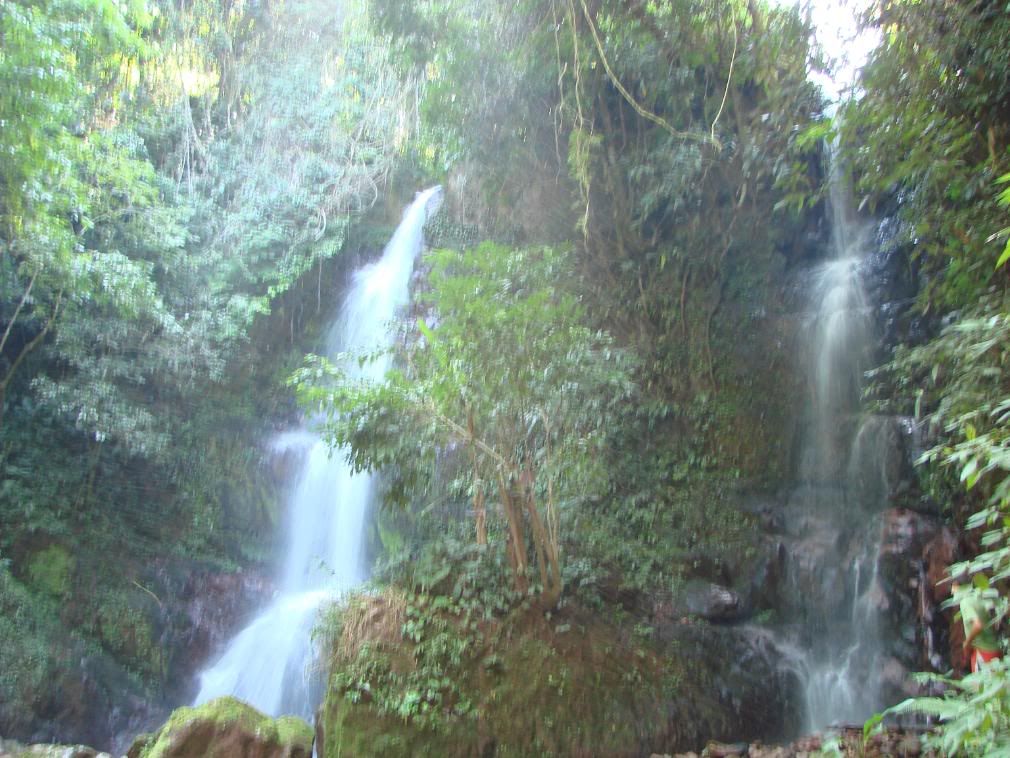 Along the way, our trekking guides chopped down some fresh sugar cane which we eagerly chewed. After a few hours, we arrived at a couple of beautiful waterfalls under which Jason and Gui had a frigid swim. There, we met up with some of the villagers in their colorful traditional garb, who cooked us lunch served on banana leafs. After lunch, we split into two groups: Jason, Gui, and the European couple were lured on an “adventure” to another waterfall that had never been visited by non-locals while Priti and the Israelis took a more relaxed path to the Ahka village where we were sleeping that night.
Along the way, our trekking guides chopped down some fresh sugar cane which we eagerly chewed. After a few hours, we arrived at a couple of beautiful waterfalls under which Jason and Gui had a frigid swim. There, we met up with some of the villagers in their colorful traditional garb, who cooked us lunch served on banana leafs. After lunch, we split into two groups: Jason, Gui, and the European couple were lured on an “adventure” to another waterfall that had never been visited by non-locals while Priti and the Israelis took a more relaxed path to the Ahka village where we were sleeping that night. 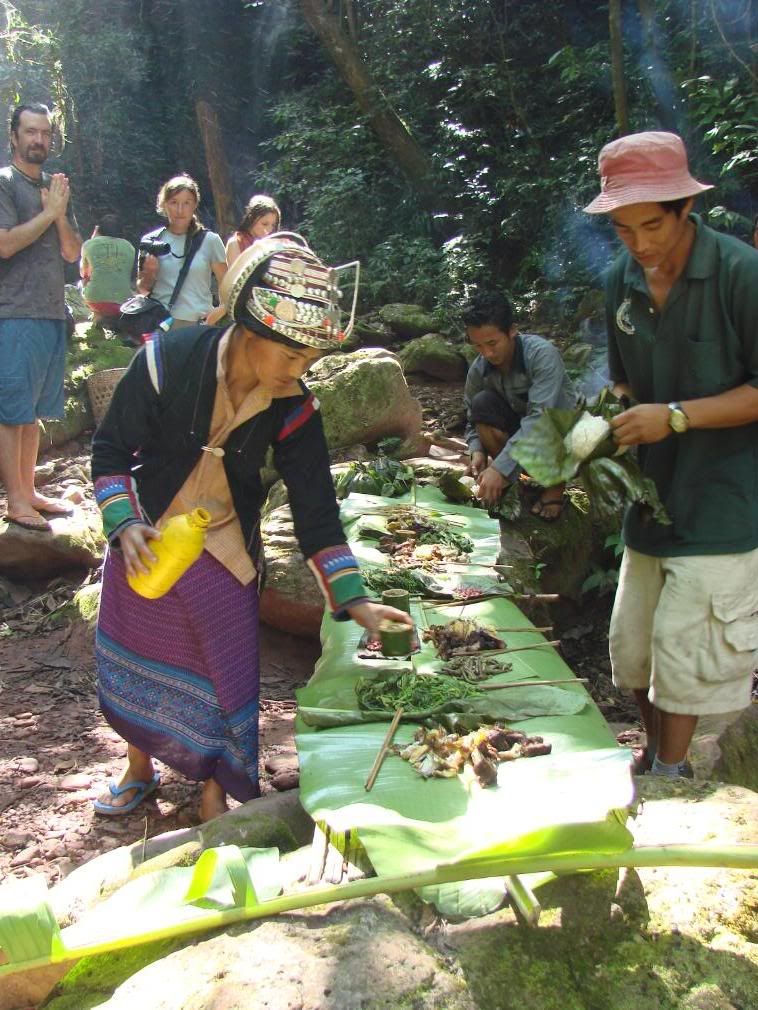 For Jason’s group, the adventure started immediately as they climbed nearly vertically adjacent to the waterfall before reaching a path after about 15 minutes. The trail eventually vanished and Jason found himself in the precarious situation of descending an incredibly steep mountain where there was no trail and nothing secure to prevent him falling to his death. Whereas the guides, who weighed about 60 kg (130 lbs) could step on the rocks, when Jason stepped on them they slid down the mountain. Even the decayed trees would snap when he grabbed hold. There was about a half-hour time span where he feared each step might be his last. After each of us fell about a half-dozen times (except for Gui, who was younger and more agile), the guides began to dig divets with their knives to give us a modicum of footing. At the bottom of the mountain, by which time Jason had cut open a finger and scraped up his legs, was a river that the guides mistakenly thought would serve as a sufficient trail.
For Jason’s group, the adventure started immediately as they climbed nearly vertically adjacent to the waterfall before reaching a path after about 15 minutes. The trail eventually vanished and Jason found himself in the precarious situation of descending an incredibly steep mountain where there was no trail and nothing secure to prevent him falling to his death. Whereas the guides, who weighed about 60 kg (130 lbs) could step on the rocks, when Jason stepped on them they slid down the mountain. Even the decayed trees would snap when he grabbed hold. There was about a half-hour time span where he feared each step might be his last. After each of us fell about a half-dozen times (except for Gui, who was younger and more agile), the guides began to dig divets with their knives to give us a modicum of footing. At the bottom of the mountain, by which time Jason had cut open a finger and scraped up his legs, was a river that the guides mistakenly thought would serve as a sufficient trail. 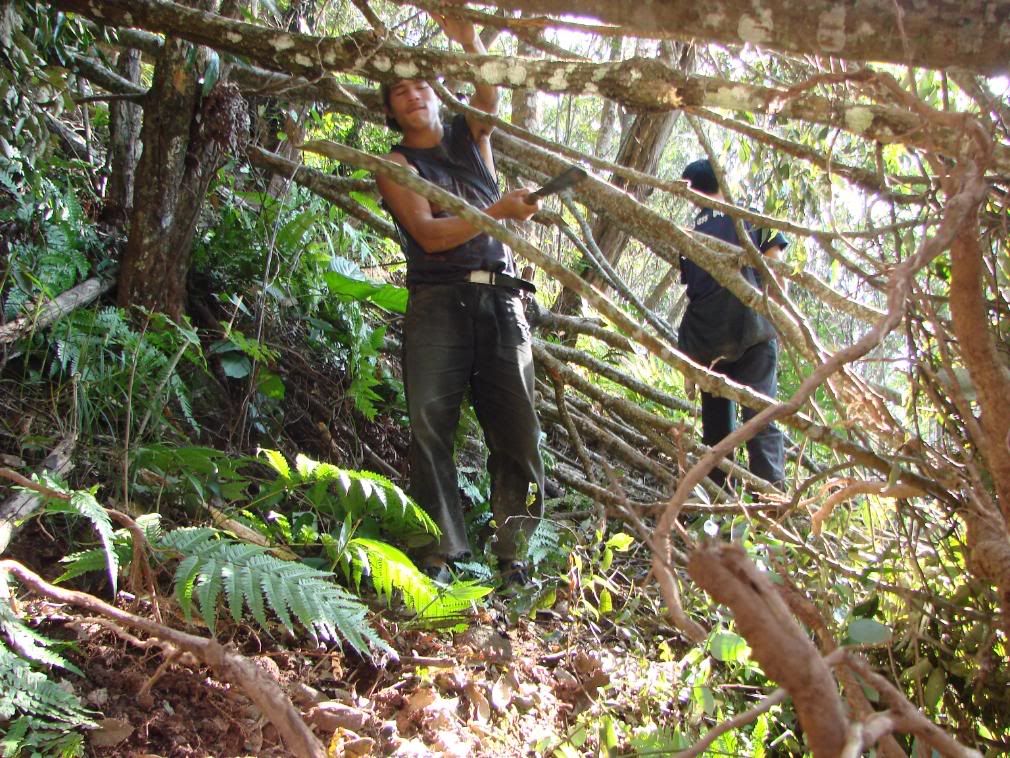 After slipping several times on the wet rocks and soaking our shoes we all were getting increasingly frustrated with our “adventure.” The guides themselves seemed unsure about how to proceed and eventually began arguing over whether to continue along the river or head back up another mountain. As the sky was quickly darkening, we decided the river was no longer feasible and demanded a change of course. As we ascended the mountain, it quickly became evident that we would not make it back before nightfall; rather, as the guides informed us, we were still at least three hours from the village! The three hours passed without much incident, although the Slovenian women lost her cool and started yelling at everyone after she fell yet again.
After slipping several times on the wet rocks and soaking our shoes we all were getting increasingly frustrated with our “adventure.” The guides themselves seemed unsure about how to proceed and eventually began arguing over whether to continue along the river or head back up another mountain. As the sky was quickly darkening, we decided the river was no longer feasible and demanded a change of course. As we ascended the mountain, it quickly became evident that we would not make it back before nightfall; rather, as the guides informed us, we were still at least three hours from the village! The three hours passed without much incident, although the Slovenian women lost her cool and started yelling at everyone after she fell yet again.
While Jason's life was hanging by a rotting tree, Priti enjoyed a nice easygoing hike with the two Israelis and one of the Ahka tribeswoman who did not speak a word, but throughout the hike had an expression of comfort without looking blissful or smiling or frowning. Upon arriving in the village, Priti was shown our bamboo hut and she also walked around to see some of the other huts on stilts. The children gazed curiously and waved hello while the wild pigs, chicken and ducks roamed free.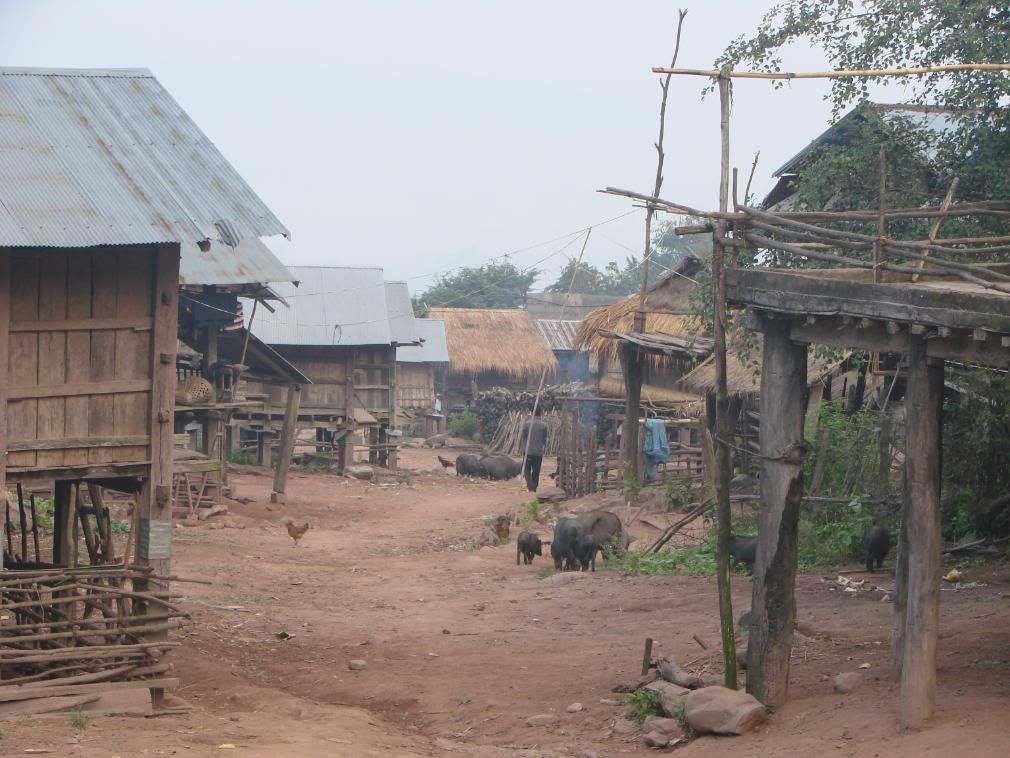 The exceptions were a whimpering duck and chicken that a young boy carried by the necks. The Israeli girls were freaking out because the animals were being “tortured” and it wasn’t kosher. Priti watched as the animals were slaughtered and had their feathers removed. After the duck’s feathers were removed, a male villager plunged it into almost boiling water and then proceeded to remove more fine feathers. He then took the dead animals and roasted their skin by holding the duck feet above the fire and then removing the webbing of the feet. As the darkness descended, she began to worry about Jason’s group, fearing that perhaps someone had sustained an injury without any way to contact others for help.
The exceptions were a whimpering duck and chicken that a young boy carried by the necks. The Israeli girls were freaking out because the animals were being “tortured” and it wasn’t kosher. Priti watched as the animals were slaughtered and had their feathers removed. After the duck’s feathers were removed, a male villager plunged it into almost boiling water and then proceeded to remove more fine feathers. He then took the dead animals and roasted their skin by holding the duck feet above the fire and then removing the webbing of the feet. As the darkness descended, she began to worry about Jason’s group, fearing that perhaps someone had sustained an injury without any way to contact others for help.
When Jason’s group finally arrived nearly two hours late, the five of them were sore, exhausted and annoyed that they had been subjected to such danger, even though they all had requested an adventure. The guides were very apologetic and ensured that no tourists would be taken on that “adventure” henceforth.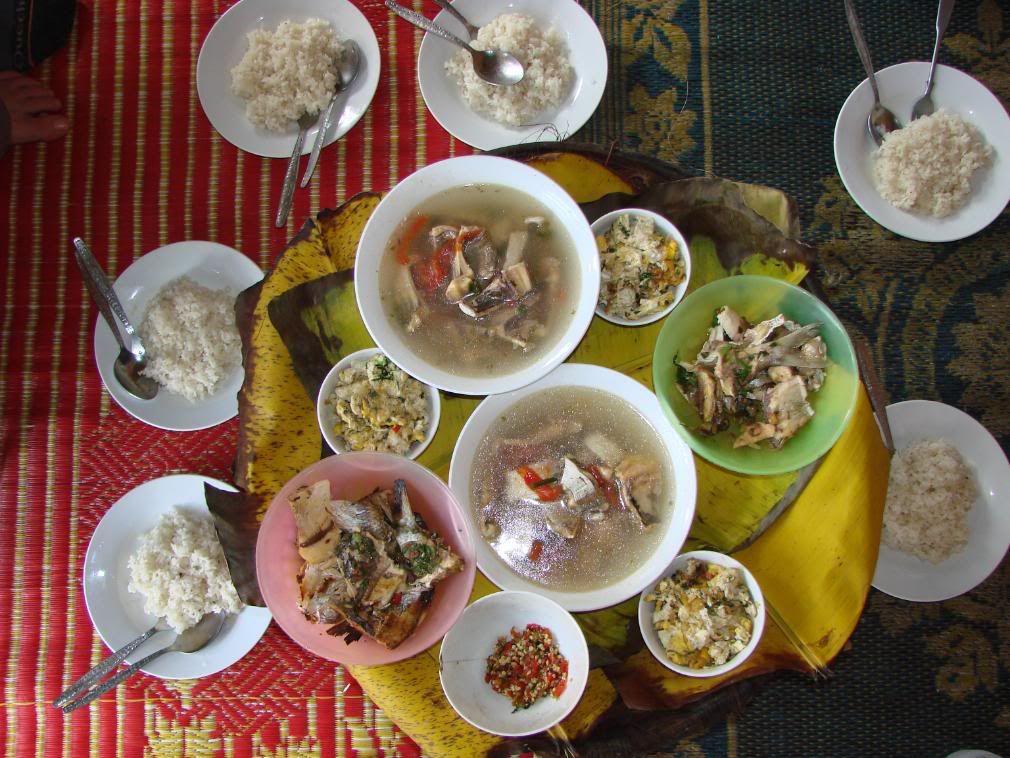 Jason’s annoyance from the hike did not dissipate after being exposed to a scalding hot shower and adding burns to his menagerie of minor injuries. Thankfully, the dinner the Akha villagers prepared for us was spectacular—ten different dishes including the fresh chicken and duck mixed together, cabbage soup, mixed veggies dish, and an incredible pumpkin curry. The villagers were with us the entire time, enjoying the meal and not hassling us. After our superb meal, everyone (except Priti due to her lingering esophageal pain) drank Lao-Lao which is the local rice liquor, brewed in the village.
Jason’s annoyance from the hike did not dissipate after being exposed to a scalding hot shower and adding burns to his menagerie of minor injuries. Thankfully, the dinner the Akha villagers prepared for us was spectacular—ten different dishes including the fresh chicken and duck mixed together, cabbage soup, mixed veggies dish, and an incredible pumpkin curry. The villagers were with us the entire time, enjoying the meal and not hassling us. After our superb meal, everyone (except Priti due to her lingering esophageal pain) drank Lao-Lao which is the local rice liquor, brewed in the village. 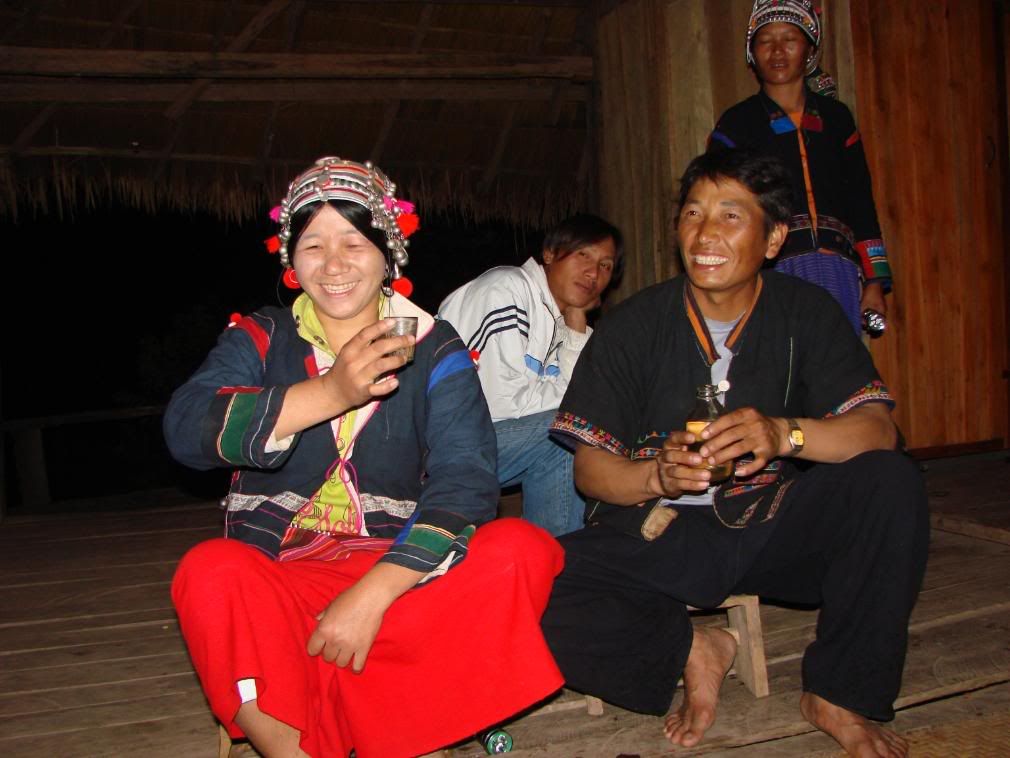 This was followed by the villagers sitting around a fire inside the hut and singing some folk songs. Our evening concluded with an interesting massage from the villagers which included having our toes individually pulled until they popped, causing each of us to laugh and yelp in pain.
This was followed by the villagers sitting around a fire inside the hut and singing some folk songs. Our evening concluded with an interesting massage from the villagers which included having our toes individually pulled until they popped, causing each of us to laugh and yelp in pain.
The following morning, Priti arose earlier than most and walked along the village. The children initially were very coy and hid partially behind doorways, peering out at the strangely dressed woman. After awhile, they then came down and wanted their pictures taken, which Priti happily obliged. Later we were treated to another ten course meal and filled our bellies in preparation for the day’s hike to several more villages.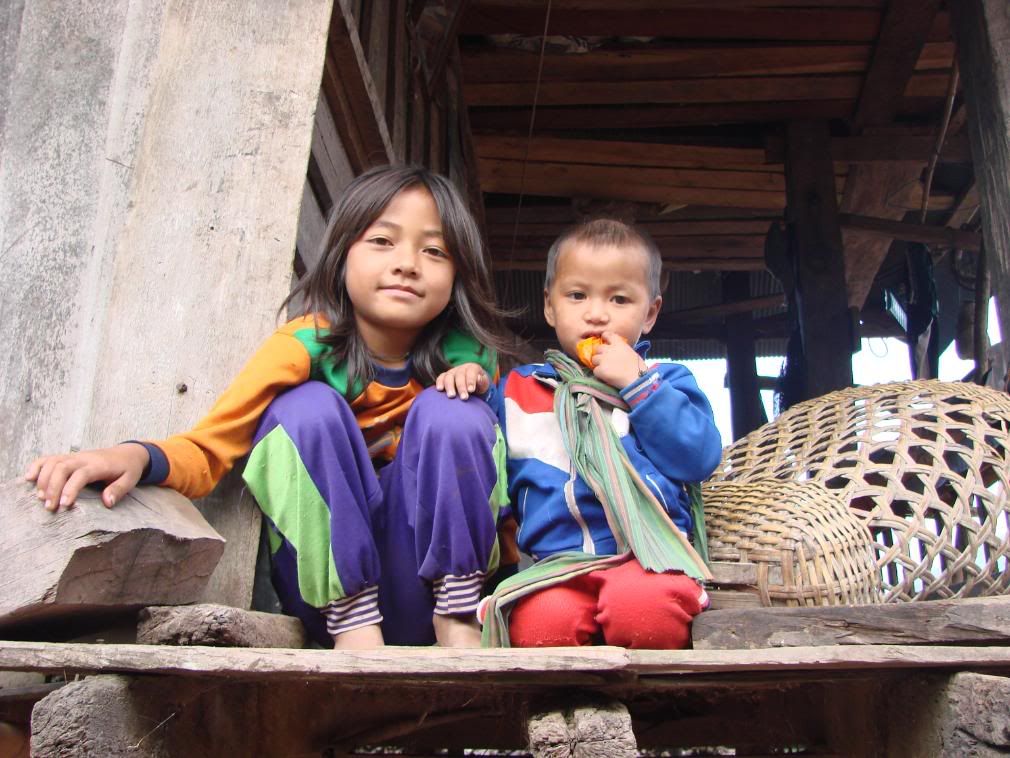 As we visited each one, we commented on how we felt like we were the ones being observed as much as observing and how it was as if we were in a National Geographic special. The villages were all stilt houses made of bamboo and wood with thatched roofs made of banana leaves. One of them had just received electricity, as evidenced by its brand new watt hour meter reading of two. Oblivious to our presence, some of the women walked around bare-chested while others breastfed, a stark contrast to western culture, which shamefully treats breastfeeding as if it’s a taboo. Kids were running around sans clothing as well, playing a form of bowling with tattered sandals and rusted aluminum cans. People were comfortable being themselves; a wonderful environment that we felt extremely privileged to witness. We ventured onward to another village where they tried teaching us how to spin cotton and Priti enjoyed the effort despite her failure to keep the thread in tact.
As we visited each one, we commented on how we felt like we were the ones being observed as much as observing and how it was as if we were in a National Geographic special. The villages were all stilt houses made of bamboo and wood with thatched roofs made of banana leaves. One of them had just received electricity, as evidenced by its brand new watt hour meter reading of two. Oblivious to our presence, some of the women walked around bare-chested while others breastfed, a stark contrast to western culture, which shamefully treats breastfeeding as if it’s a taboo. Kids were running around sans clothing as well, playing a form of bowling with tattered sandals and rusted aluminum cans. People were comfortable being themselves; a wonderful environment that we felt extremely privileged to witness. We ventured onward to another village where they tried teaching us how to spin cotton and Priti enjoyed the effort despite her failure to keep the thread in tact. 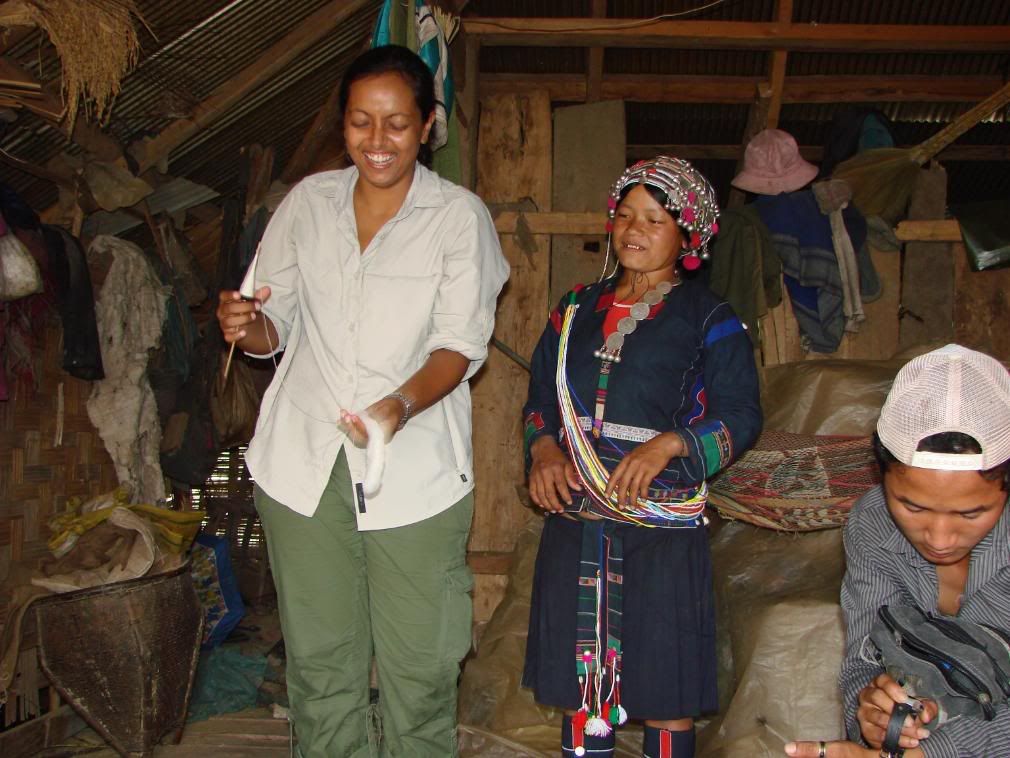 After their demonstration, the village people gave us a gift of handmade, woven pouches. It was awesome. Some of the boys showed off their slingshot skills while Jason chased several of the girls, who ran away laughing and screaming (save for one who was mute). We were then shown that village’s "bachelor" room, which is a tiny room attached to the family’s home in which their young son can practice having sex with other women.
After their demonstration, the village people gave us a gift of handmade, woven pouches. It was awesome. Some of the boys showed off their slingshot skills while Jason chased several of the girls, who ran away laughing and screaming (save for one who was mute). We were then shown that village’s "bachelor" room, which is a tiny room attached to the family’s home in which their young son can practice having sex with other women. 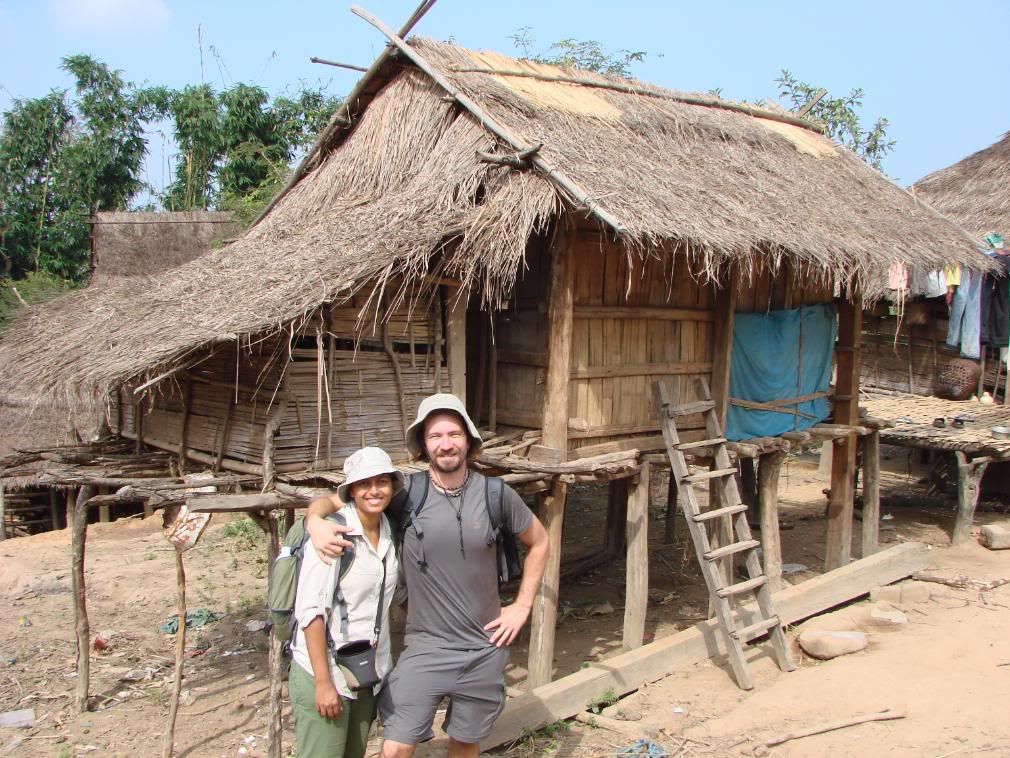 There’s also such a thing as a youth leader who, if a boy is interested, can ask a girl to spend the night with him, even if she already has a boyfriend. The girl cannot refuse and if she becomes pregnant, another older man in the village marries her or shy gets kicked out of the village! Despite our revulsion with such oppressive traditions and Jason’s near-death experience, we thoroughly enjoyed the Akha experience.
There’s also such a thing as a youth leader who, if a boy is interested, can ask a girl to spend the night with him, even if she already has a boyfriend. The girl cannot refuse and if she becomes pregnant, another older man in the village marries her or shy gets kicked out of the village! Despite our revulsion with such oppressive traditions and Jason’s near-death experience, we thoroughly enjoyed the Akha experience.
After we were finished trekking, we caught a tuk-tuk that died in the middle of nowhere. Some of us were concerned because we were planning to catch a bus to Nam Tra, that was to depart just minutes hence. Luckily, a truck with an open back was driving by and our tour guide asked if we could hop on. We all got on the back, standing up while two locals sat on a tire. It was fun having the wind blow in our face as we drove through town.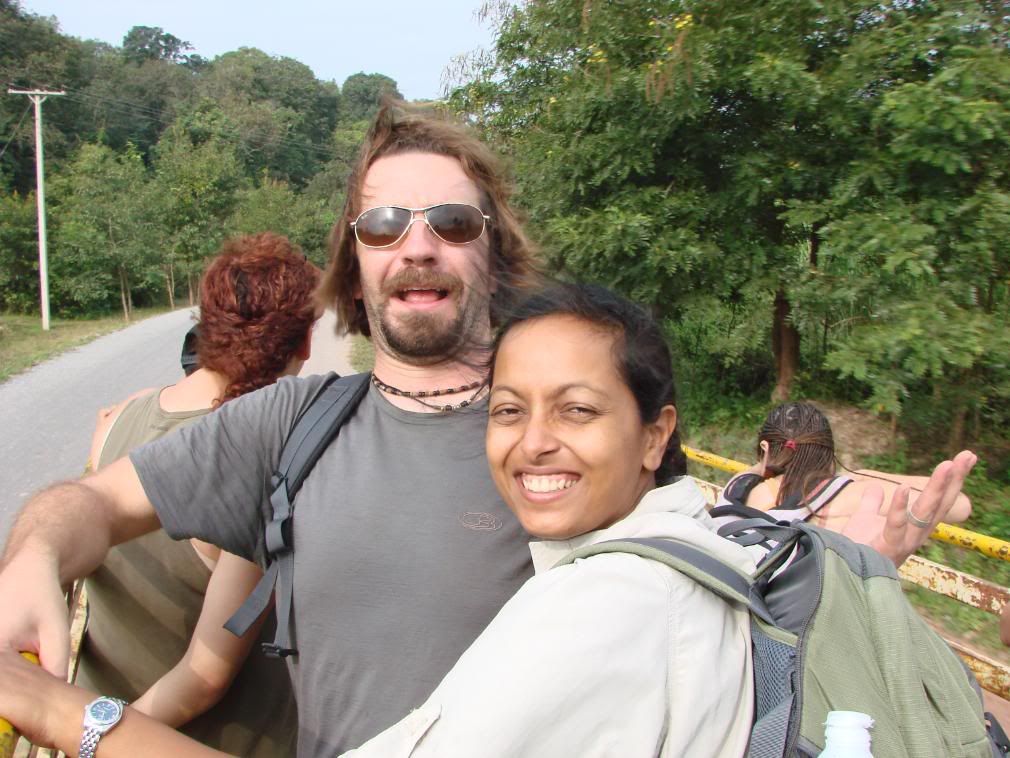 The locals quizzically stared as we drove by. Thankfully, we didn’t miss our bus and made it back to Luang Nam Tha. That evening, we went to some type of carnival, where vendors sold all types of food and the children played a game that involved throwing darts at a board filled with balloons; three hits resulted in a prize. Jason, despite being a regular darts player, was unable to win after repeated attempts. The evening was also significant because it was our first taste of BeerLao, which is one of the best beers on earth and costs about $1 for a big bottle (i.e., 2 beers).
The locals quizzically stared as we drove by. Thankfully, we didn’t miss our bus and made it back to Luang Nam Tha. That evening, we went to some type of carnival, where vendors sold all types of food and the children played a game that involved throwing darts at a board filled with balloons; three hits resulted in a prize. Jason, despite being a regular darts player, was unable to win after repeated attempts. The evening was also significant because it was our first taste of BeerLao, which is one of the best beers on earth and costs about $1 for a big bottle (i.e., 2 beers).
Early the next morning we arrived at the bus station, and were disappointed that our bus was not departing for another two hours, especially since we knew it was going to be a long journey. During the ten hour ride, we stopped for several restroom breaks, which consisted of stopping on the road and all of us fanning out along the road; men turned their backs and women squatted discreetly a meter into the brush. About four hours into the trip, as we passed a motorcycle, there was a loud crash as the front window next to the driver shattered.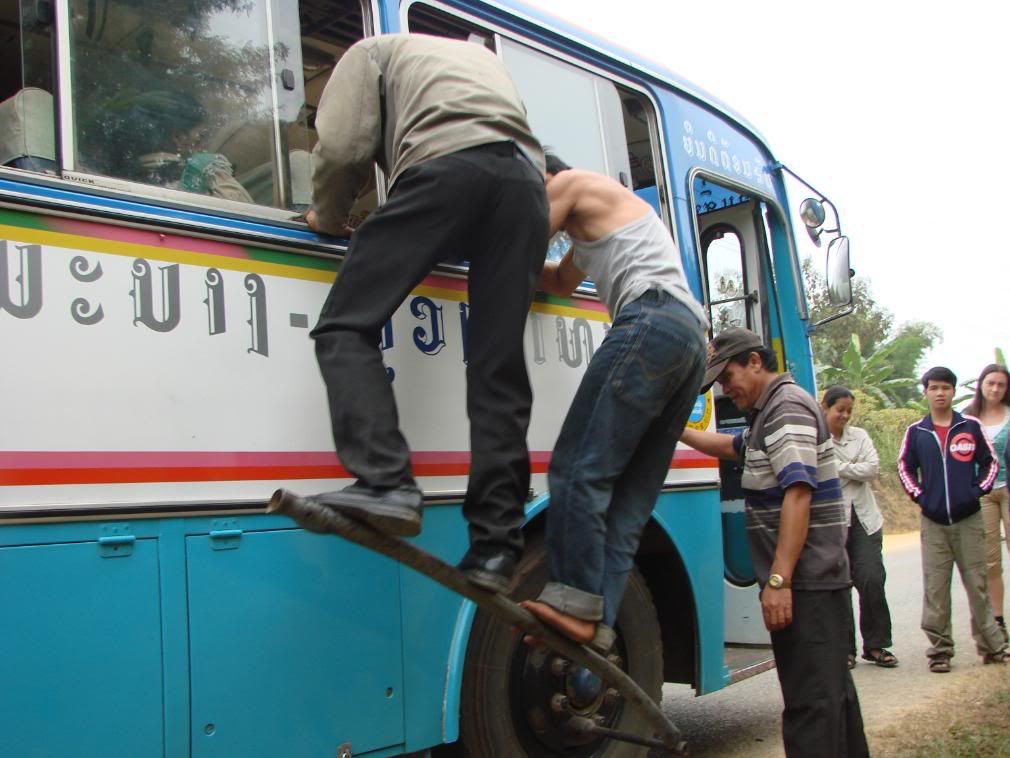 We turned around expecting to see the motorist on the ground, but apparently there was another cause as the motorcyclist kept going. The mystery remained unsolved after a half hour of sitting there trying to figure out what had happened. About an hour later, the bus suffered a flat tire, which is virtually inevitable on this route due to the condition and windiness of the road. After we arrived in Luang Prabang, Jason discovered that his water bottle and sunglasses (his 6th pair thus far on the trip!) had been swiped by another passenger.
We turned around expecting to see the motorist on the ground, but apparently there was another cause as the motorcyclist kept going. The mystery remained unsolved after a half hour of sitting there trying to figure out what had happened. About an hour later, the bus suffered a flat tire, which is virtually inevitable on this route due to the condition and windiness of the road. After we arrived in Luang Prabang, Jason discovered that his water bottle and sunglasses (his 6th pair thus far on the trip!) had been swiped by another passenger.
From what we had heard and read about Luang Prabang (another LP), it seemed like it would be one of those cities that has its own distinct culture. There was a heavy French influence, and it seemed like everywhere we turned there were French tourists, of whom we’d encountered very few in our travels thus far.
 Along the way, our trekking guides chopped down some fresh sugar cane which we eagerly chewed. After a few hours, we arrived at a couple of beautiful waterfalls under which Jason and Gui had a frigid swim. There, we met up with some of the villagers in their colorful traditional garb, who cooked us lunch served on banana leafs. After lunch, we split into two groups: Jason, Gui, and the European couple were lured on an “adventure” to another waterfall that had never been visited by non-locals while Priti and the Israelis took a more relaxed path to the Ahka village where we were sleeping that night.
Along the way, our trekking guides chopped down some fresh sugar cane which we eagerly chewed. After a few hours, we arrived at a couple of beautiful waterfalls under which Jason and Gui had a frigid swim. There, we met up with some of the villagers in their colorful traditional garb, who cooked us lunch served on banana leafs. After lunch, we split into two groups: Jason, Gui, and the European couple were lured on an “adventure” to another waterfall that had never been visited by non-locals while Priti and the Israelis took a more relaxed path to the Ahka village where we were sleeping that night.  For Jason’s group, the adventure started immediately as they climbed nearly vertically adjacent to the waterfall before reaching a path after about 15 minutes. The trail eventually vanished and Jason found himself in the precarious situation of descending an incredibly steep mountain where there was no trail and nothing secure to prevent him falling to his death. Whereas the guides, who weighed about 60 kg (130 lbs) could step on the rocks, when Jason stepped on them they slid down the mountain. Even the decayed trees would snap when he grabbed hold. There was about a half-hour time span where he feared each step might be his last. After each of us fell about a half-dozen times (except for Gui, who was younger and more agile), the guides began to dig divets with their knives to give us a modicum of footing. At the bottom of the mountain, by which time Jason had cut open a finger and scraped up his legs, was a river that the guides mistakenly thought would serve as a sufficient trail.
For Jason’s group, the adventure started immediately as they climbed nearly vertically adjacent to the waterfall before reaching a path after about 15 minutes. The trail eventually vanished and Jason found himself in the precarious situation of descending an incredibly steep mountain where there was no trail and nothing secure to prevent him falling to his death. Whereas the guides, who weighed about 60 kg (130 lbs) could step on the rocks, when Jason stepped on them they slid down the mountain. Even the decayed trees would snap when he grabbed hold. There was about a half-hour time span where he feared each step might be his last. After each of us fell about a half-dozen times (except for Gui, who was younger and more agile), the guides began to dig divets with their knives to give us a modicum of footing. At the bottom of the mountain, by which time Jason had cut open a finger and scraped up his legs, was a river that the guides mistakenly thought would serve as a sufficient trail.  After slipping several times on the wet rocks and soaking our shoes we all were getting increasingly frustrated with our “adventure.” The guides themselves seemed unsure about how to proceed and eventually began arguing over whether to continue along the river or head back up another mountain. As the sky was quickly darkening, we decided the river was no longer feasible and demanded a change of course. As we ascended the mountain, it quickly became evident that we would not make it back before nightfall; rather, as the guides informed us, we were still at least three hours from the village! The three hours passed without much incident, although the Slovenian women lost her cool and started yelling at everyone after she fell yet again.
After slipping several times on the wet rocks and soaking our shoes we all were getting increasingly frustrated with our “adventure.” The guides themselves seemed unsure about how to proceed and eventually began arguing over whether to continue along the river or head back up another mountain. As the sky was quickly darkening, we decided the river was no longer feasible and demanded a change of course. As we ascended the mountain, it quickly became evident that we would not make it back before nightfall; rather, as the guides informed us, we were still at least three hours from the village! The three hours passed without much incident, although the Slovenian women lost her cool and started yelling at everyone after she fell yet again.While Jason's life was hanging by a rotting tree, Priti enjoyed a nice easygoing hike with the two Israelis and one of the Ahka tribeswoman who did not speak a word, but throughout the hike had an expression of comfort without looking blissful or smiling or frowning. Upon arriving in the village, Priti was shown our bamboo hut and she also walked around to see some of the other huts on stilts. The children gazed curiously and waved hello while the wild pigs, chicken and ducks roamed free.
 The exceptions were a whimpering duck and chicken that a young boy carried by the necks. The Israeli girls were freaking out because the animals were being “tortured” and it wasn’t kosher. Priti watched as the animals were slaughtered and had their feathers removed. After the duck’s feathers were removed, a male villager plunged it into almost boiling water and then proceeded to remove more fine feathers. He then took the dead animals and roasted their skin by holding the duck feet above the fire and then removing the webbing of the feet. As the darkness descended, she began to worry about Jason’s group, fearing that perhaps someone had sustained an injury without any way to contact others for help.
The exceptions were a whimpering duck and chicken that a young boy carried by the necks. The Israeli girls were freaking out because the animals were being “tortured” and it wasn’t kosher. Priti watched as the animals were slaughtered and had their feathers removed. After the duck’s feathers were removed, a male villager plunged it into almost boiling water and then proceeded to remove more fine feathers. He then took the dead animals and roasted their skin by holding the duck feet above the fire and then removing the webbing of the feet. As the darkness descended, she began to worry about Jason’s group, fearing that perhaps someone had sustained an injury without any way to contact others for help.When Jason’s group finally arrived nearly two hours late, the five of them were sore, exhausted and annoyed that they had been subjected to such danger, even though they all had requested an adventure. The guides were very apologetic and ensured that no tourists would be taken on that “adventure” henceforth.
 Jason’s annoyance from the hike did not dissipate after being exposed to a scalding hot shower and adding burns to his menagerie of minor injuries. Thankfully, the dinner the Akha villagers prepared for us was spectacular—ten different dishes including the fresh chicken and duck mixed together, cabbage soup, mixed veggies dish, and an incredible pumpkin curry. The villagers were with us the entire time, enjoying the meal and not hassling us. After our superb meal, everyone (except Priti due to her lingering esophageal pain) drank Lao-Lao which is the local rice liquor, brewed in the village.
Jason’s annoyance from the hike did not dissipate after being exposed to a scalding hot shower and adding burns to his menagerie of minor injuries. Thankfully, the dinner the Akha villagers prepared for us was spectacular—ten different dishes including the fresh chicken and duck mixed together, cabbage soup, mixed veggies dish, and an incredible pumpkin curry. The villagers were with us the entire time, enjoying the meal and not hassling us. After our superb meal, everyone (except Priti due to her lingering esophageal pain) drank Lao-Lao which is the local rice liquor, brewed in the village.  This was followed by the villagers sitting around a fire inside the hut and singing some folk songs. Our evening concluded with an interesting massage from the villagers which included having our toes individually pulled until they popped, causing each of us to laugh and yelp in pain.
This was followed by the villagers sitting around a fire inside the hut and singing some folk songs. Our evening concluded with an interesting massage from the villagers which included having our toes individually pulled until they popped, causing each of us to laugh and yelp in pain.The following morning, Priti arose earlier than most and walked along the village. The children initially were very coy and hid partially behind doorways, peering out at the strangely dressed woman. After awhile, they then came down and wanted their pictures taken, which Priti happily obliged. Later we were treated to another ten course meal and filled our bellies in preparation for the day’s hike to several more villages.
 As we visited each one, we commented on how we felt like we were the ones being observed as much as observing and how it was as if we were in a National Geographic special. The villages were all stilt houses made of bamboo and wood with thatched roofs made of banana leaves. One of them had just received electricity, as evidenced by its brand new watt hour meter reading of two. Oblivious to our presence, some of the women walked around bare-chested while others breastfed, a stark contrast to western culture, which shamefully treats breastfeeding as if it’s a taboo. Kids were running around sans clothing as well, playing a form of bowling with tattered sandals and rusted aluminum cans. People were comfortable being themselves; a wonderful environment that we felt extremely privileged to witness. We ventured onward to another village where they tried teaching us how to spin cotton and Priti enjoyed the effort despite her failure to keep the thread in tact.
As we visited each one, we commented on how we felt like we were the ones being observed as much as observing and how it was as if we were in a National Geographic special. The villages were all stilt houses made of bamboo and wood with thatched roofs made of banana leaves. One of them had just received electricity, as evidenced by its brand new watt hour meter reading of two. Oblivious to our presence, some of the women walked around bare-chested while others breastfed, a stark contrast to western culture, which shamefully treats breastfeeding as if it’s a taboo. Kids were running around sans clothing as well, playing a form of bowling with tattered sandals and rusted aluminum cans. People were comfortable being themselves; a wonderful environment that we felt extremely privileged to witness. We ventured onward to another village where they tried teaching us how to spin cotton and Priti enjoyed the effort despite her failure to keep the thread in tact.  After their demonstration, the village people gave us a gift of handmade, woven pouches. It was awesome. Some of the boys showed off their slingshot skills while Jason chased several of the girls, who ran away laughing and screaming (save for one who was mute). We were then shown that village’s "bachelor" room, which is a tiny room attached to the family’s home in which their young son can practice having sex with other women.
After their demonstration, the village people gave us a gift of handmade, woven pouches. It was awesome. Some of the boys showed off their slingshot skills while Jason chased several of the girls, who ran away laughing and screaming (save for one who was mute). We were then shown that village’s "bachelor" room, which is a tiny room attached to the family’s home in which their young son can practice having sex with other women.  There’s also such a thing as a youth leader who, if a boy is interested, can ask a girl to spend the night with him, even if she already has a boyfriend. The girl cannot refuse and if she becomes pregnant, another older man in the village marries her or shy gets kicked out of the village! Despite our revulsion with such oppressive traditions and Jason’s near-death experience, we thoroughly enjoyed the Akha experience.
There’s also such a thing as a youth leader who, if a boy is interested, can ask a girl to spend the night with him, even if she already has a boyfriend. The girl cannot refuse and if she becomes pregnant, another older man in the village marries her or shy gets kicked out of the village! Despite our revulsion with such oppressive traditions and Jason’s near-death experience, we thoroughly enjoyed the Akha experience.After we were finished trekking, we caught a tuk-tuk that died in the middle of nowhere. Some of us were concerned because we were planning to catch a bus to Nam Tra, that was to depart just minutes hence. Luckily, a truck with an open back was driving by and our tour guide asked if we could hop on. We all got on the back, standing up while two locals sat on a tire. It was fun having the wind blow in our face as we drove through town.
 The locals quizzically stared as we drove by. Thankfully, we didn’t miss our bus and made it back to Luang Nam Tha. That evening, we went to some type of carnival, where vendors sold all types of food and the children played a game that involved throwing darts at a board filled with balloons; three hits resulted in a prize. Jason, despite being a regular darts player, was unable to win after repeated attempts. The evening was also significant because it was our first taste of BeerLao, which is one of the best beers on earth and costs about $1 for a big bottle (i.e., 2 beers).
The locals quizzically stared as we drove by. Thankfully, we didn’t miss our bus and made it back to Luang Nam Tha. That evening, we went to some type of carnival, where vendors sold all types of food and the children played a game that involved throwing darts at a board filled with balloons; three hits resulted in a prize. Jason, despite being a regular darts player, was unable to win after repeated attempts. The evening was also significant because it was our first taste of BeerLao, which is one of the best beers on earth and costs about $1 for a big bottle (i.e., 2 beers).Early the next morning we arrived at the bus station, and were disappointed that our bus was not departing for another two hours, especially since we knew it was going to be a long journey. During the ten hour ride, we stopped for several restroom breaks, which consisted of stopping on the road and all of us fanning out along the road; men turned their backs and women squatted discreetly a meter into the brush. About four hours into the trip, as we passed a motorcycle, there was a loud crash as the front window next to the driver shattered.
 We turned around expecting to see the motorist on the ground, but apparently there was another cause as the motorcyclist kept going. The mystery remained unsolved after a half hour of sitting there trying to figure out what had happened. About an hour later, the bus suffered a flat tire, which is virtually inevitable on this route due to the condition and windiness of the road. After we arrived in Luang Prabang, Jason discovered that his water bottle and sunglasses (his 6th pair thus far on the trip!) had been swiped by another passenger.
We turned around expecting to see the motorist on the ground, but apparently there was another cause as the motorcyclist kept going. The mystery remained unsolved after a half hour of sitting there trying to figure out what had happened. About an hour later, the bus suffered a flat tire, which is virtually inevitable on this route due to the condition and windiness of the road. After we arrived in Luang Prabang, Jason discovered that his water bottle and sunglasses (his 6th pair thus far on the trip!) had been swiped by another passenger.From what we had heard and read about Luang Prabang (another LP), it seemed like it would be one of those cities that has its own distinct culture. There was a heavy French influence, and it seemed like everywhere we turned there were French tourists, of whom we’d encountered very few in our travels thus far.
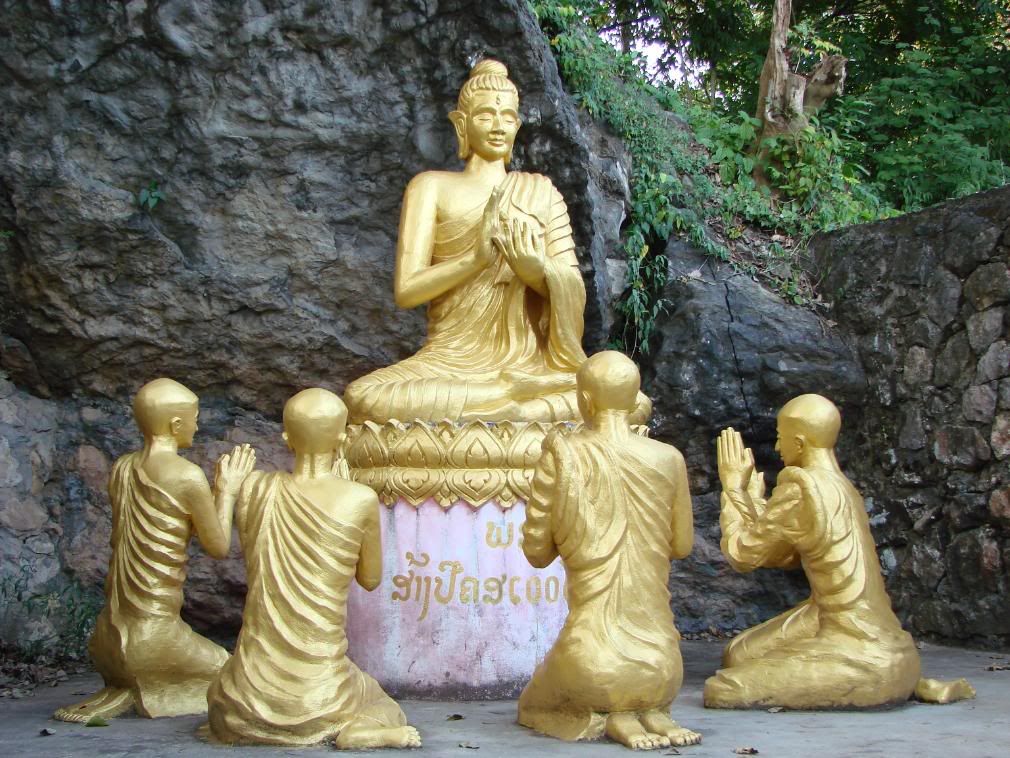 There is a huge hill in the middle, with a series of Buddhist Wats atop it, as well as inside a series of caves within the hill, one of which apparently contained a footprint of Buddha. The top of the hill is also a popular sunset spot, according to LP (the guidebook). Granted, it was a nice view with the sun setting over a mountaintop, but it was also a zoo up there, with tourists of all nationalities jostling for the best spot and some openly shoving others in their zeal to get the perfect picture. Jason was nearly knocked over a ledge by a European with a camera lens bigger than his concern for others' safety. Later that night, we ran into Carol, a Californian we’d hung out with in Pai. She seemed a bit out of it and recounted her horrific journey on the overnight bus from Pai.
There is a huge hill in the middle, with a series of Buddhist Wats atop it, as well as inside a series of caves within the hill, one of which apparently contained a footprint of Buddha. The top of the hill is also a popular sunset spot, according to LP (the guidebook). Granted, it was a nice view with the sun setting over a mountaintop, but it was also a zoo up there, with tourists of all nationalities jostling for the best spot and some openly shoving others in their zeal to get the perfect picture. Jason was nearly knocked over a ledge by a European with a camera lens bigger than his concern for others' safety. Later that night, we ran into Carol, a Californian we’d hung out with in Pai. She seemed a bit out of it and recounted her horrific journey on the overnight bus from Pai. 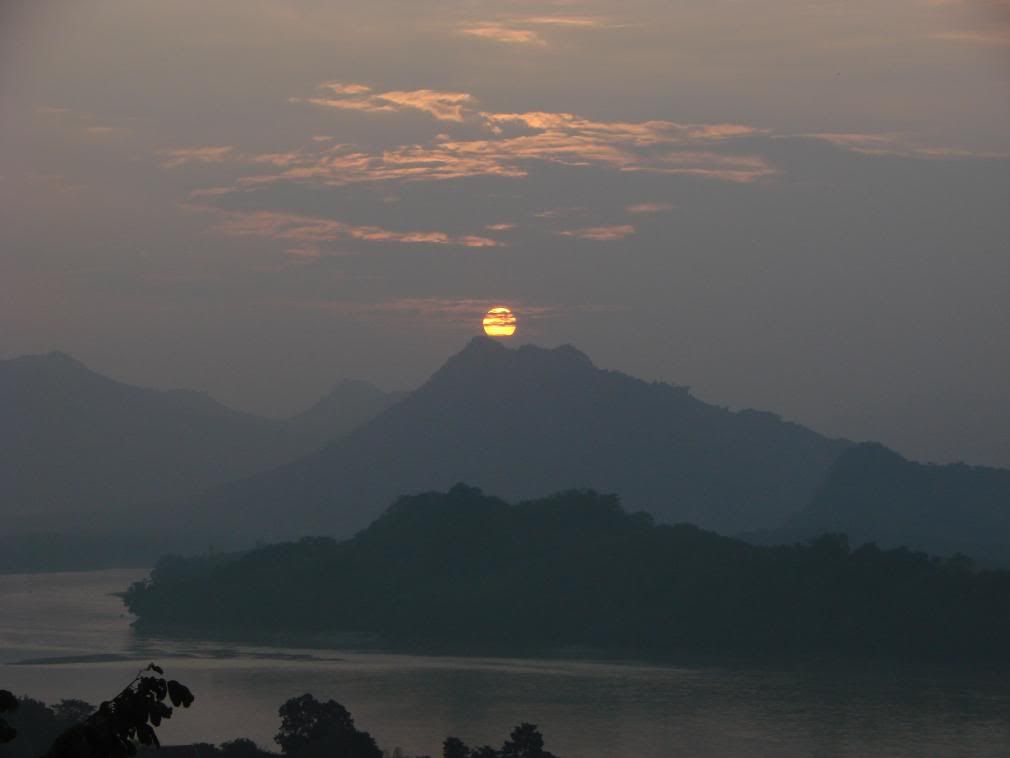 The driver, intoxicated, had crashed their bus into a tree at about 4 am. Most of the eight passengers sustained concussions and one suffered a broken arm. The driver suffered the worst, as he broke all four of his limbs and fractured his skull. His survival seemed dubious. As Carol was relating her traumatic story, a tuk-tuk drove by filled with drunken men singing Ole Ole and hanging out of the vehicle. “Oh, those were the guys on the bus with us, they’ve lost their minds,” she said, before excusing herself to get some rest. Priti, mindful of our guesthouse’s 11 pm curfew, also retired for the evening, but Jason sensed adventure so he wandered off in the direction of the tuk-tuk. After a brief visit to one of the three bars in town, he learned that the only late-night spot was a bowling alley outside of the city limits.
The driver, intoxicated, had crashed their bus into a tree at about 4 am. Most of the eight passengers sustained concussions and one suffered a broken arm. The driver suffered the worst, as he broke all four of his limbs and fractured his skull. His survival seemed dubious. As Carol was relating her traumatic story, a tuk-tuk drove by filled with drunken men singing Ole Ole and hanging out of the vehicle. “Oh, those were the guys on the bus with us, they’ve lost their minds,” she said, before excusing herself to get some rest. Priti, mindful of our guesthouse’s 11 pm curfew, also retired for the evening, but Jason sensed adventure so he wandered off in the direction of the tuk-tuk. After a brief visit to one of the three bars in town, he learned that the only late-night spot was a bowling alley outside of the city limits. 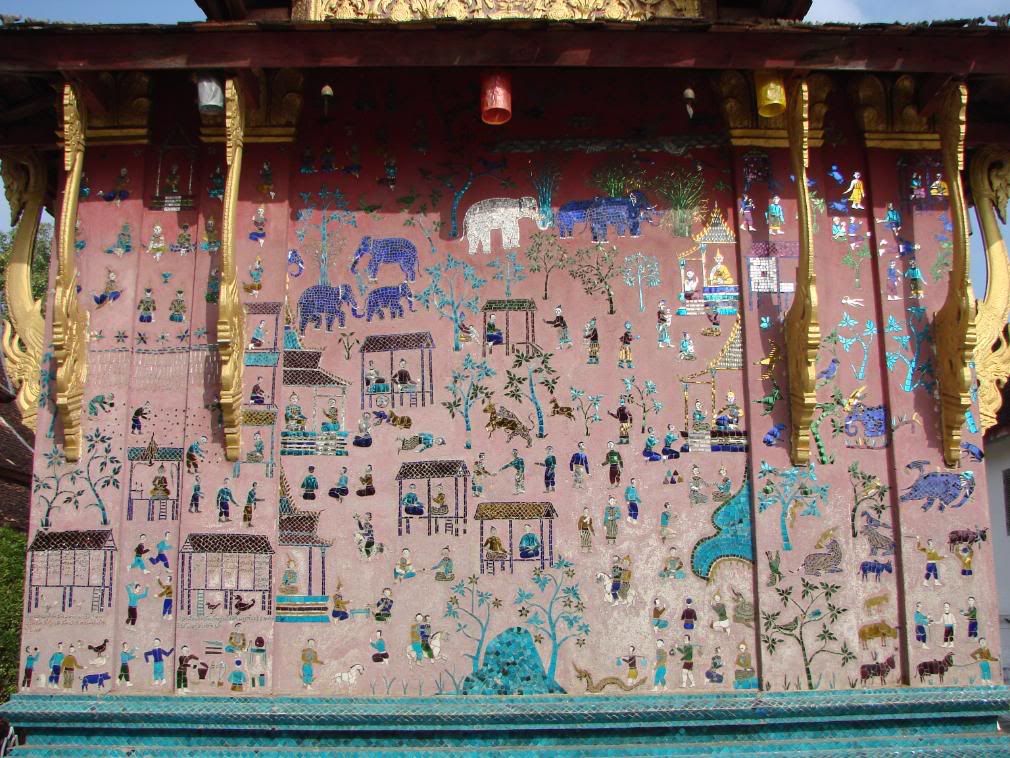 When he arrived, he witnessed pure mayhem as seemingly every table had a half-empty bottle of whiskey on it and the noise-level prevented the formation of all but the most basic thoughts. Jason spotted several of the folks from Pai and joined them in a chaotic game of bowling. Incidentally, he bowled one of his best games ever, including a turkey (i.e., three strikes in a row). It was one of the Irish guys’ birthdays and so they decided, in their post-concussive and inebriated states, that they needed to do something crazy. Before Jason knew what was happening, two of them ran down the lanes and sprawled themselves out, completely naked! Laotians are a modest people, and they love their bowling, so the Irishman’s antics were about the most offensive thing they could have done. The manager quickly hauled them off and called in a higher authority, who seemed to be like the mayor of the town. Upon hearing their transgressions, he immediately banished them from not just the city, but from the country!
When he arrived, he witnessed pure mayhem as seemingly every table had a half-empty bottle of whiskey on it and the noise-level prevented the formation of all but the most basic thoughts. Jason spotted several of the folks from Pai and joined them in a chaotic game of bowling. Incidentally, he bowled one of his best games ever, including a turkey (i.e., three strikes in a row). It was one of the Irish guys’ birthdays and so they decided, in their post-concussive and inebriated states, that they needed to do something crazy. Before Jason knew what was happening, two of them ran down the lanes and sprawled themselves out, completely naked! Laotians are a modest people, and they love their bowling, so the Irishman’s antics were about the most offensive thing they could have done. The manager quickly hauled them off and called in a higher authority, who seemed to be like the mayor of the town. Upon hearing their transgressions, he immediately banished them from not just the city, but from the country! 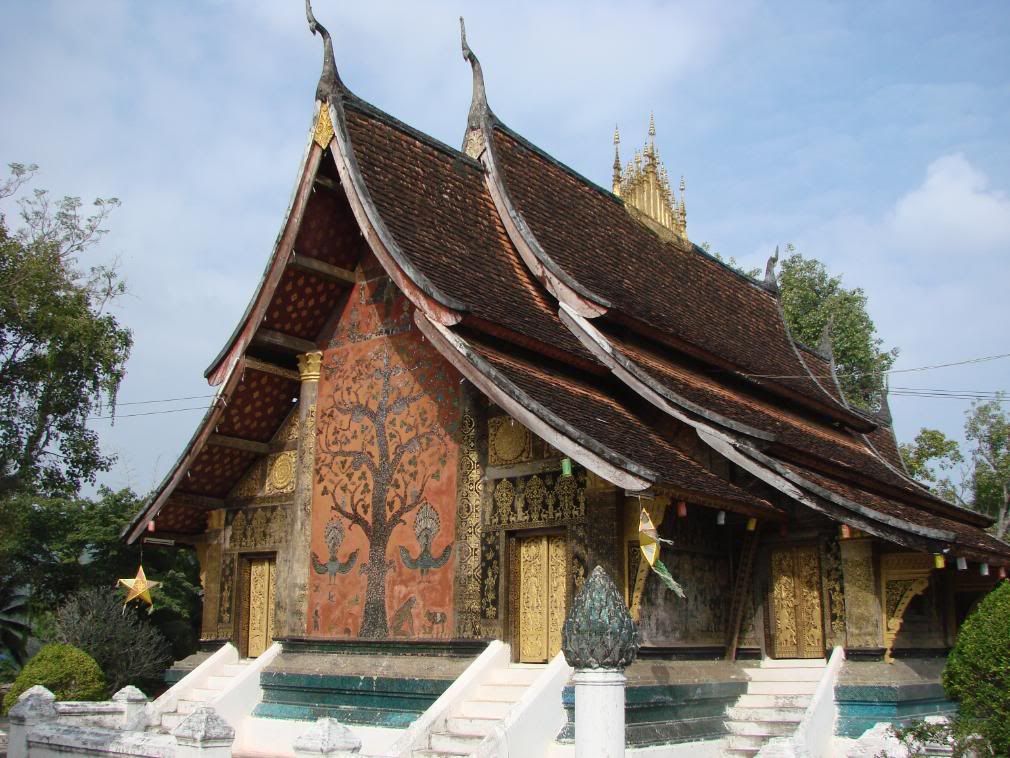 Some uniformed men arrived shortly thereafter and took them away while the rest of us looked at each other in disbelief. Upon returning to the guesthouse, it was locked, but fortunately Jason was able to wake up one of the workers to let him. Others were not so lucky and were unable to get into their rooms until 6 am the following morning.
Some uniformed men arrived shortly thereafter and took them away while the rest of us looked at each other in disbelief. Upon returning to the guesthouse, it was locked, but fortunately Jason was able to wake up one of the workers to let him. Others were not so lucky and were unable to get into their rooms until 6 am the following morning.The following day we explored the city, visiting a couple more Wats and shopping at the massive market. For lunch we feasted on some fresh baguettes. We noticed a sign advertising a Thanksgiving feast and were shocked that one of our favorite holidays almost passed without our noticing.
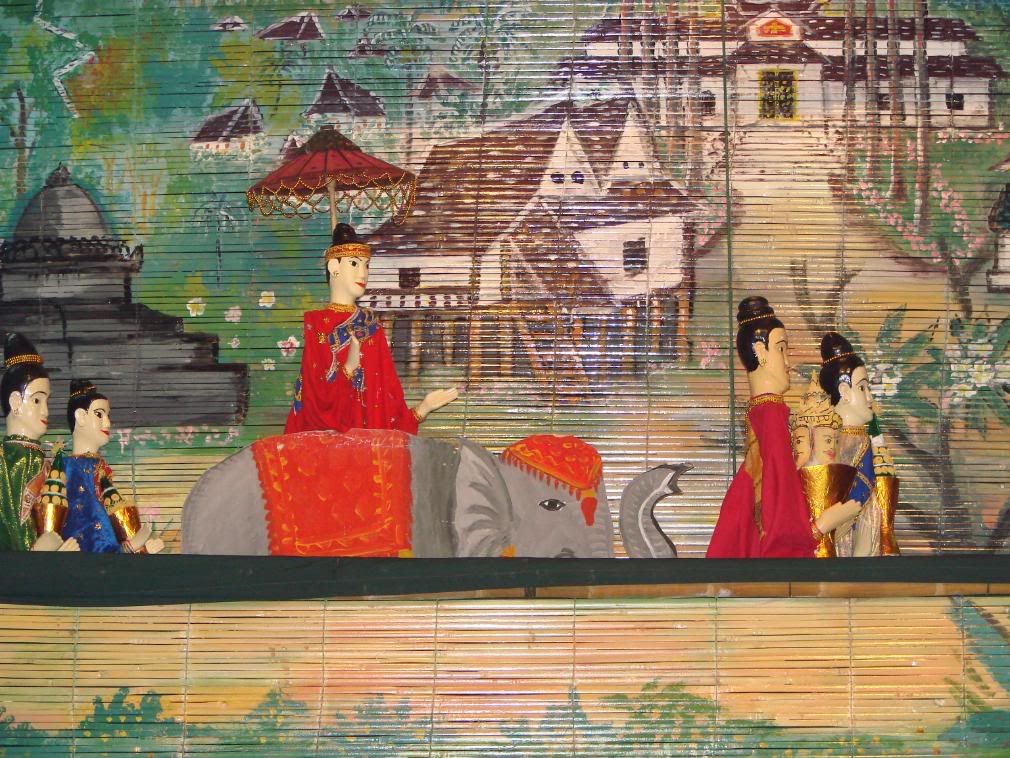 Nonetheless, given the brevity of our visit, we stuck with the local food and were rewarded with some excellent coconut curry steamed fish in a banana leaf and kai-pan, a local specialty which consisted of fried seaweed and a chili paste to dip it in. Jason loved it so much that he ordered it with every subsequent meal and even got some of the chili paste for the road. That evening we were entertained by a cultural event put on by a local children's group, that included a series of dances and puppet shows.
Nonetheless, given the brevity of our visit, we stuck with the local food and were rewarded with some excellent coconut curry steamed fish in a banana leaf and kai-pan, a local specialty which consisted of fried seaweed and a chili paste to dip it in. Jason loved it so much that he ordered it with every subsequent meal and even got some of the chili paste for the road. That evening we were entertained by a cultural event put on by a local children's group, that included a series of dances and puppet shows.Although we were thoroughly enjoying Laos, we were greatly anticipating Vietnam so we booked a flight to Hanoi for the following day, after a just a week in this gem of a country. For those of you considering a trip to SE Asia, make sure you avoid our mistake of neglecting Laos as there was much of it we had to forgo due to time constraints.
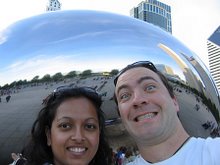


No comments:
Post a Comment